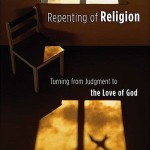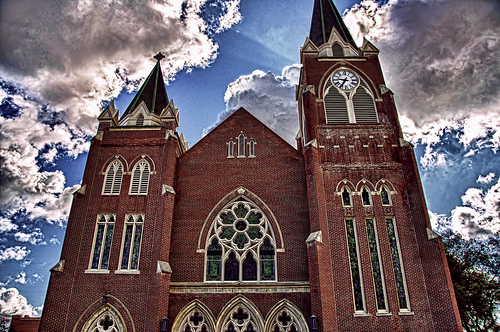We run our website the way we wished the whole internet worked: we provide high quality original content with no ads. We are funded solely by your direct support. Please consider supporting this project.
What Kind of Sinners Feel Welcomed by Your Church?
Perhaps the greatest indictment on evangelical churches today is that they are not generally known as refuge houses for sinners—places where hurting, wounded, sinful people can run and find love that does not question, an understanding that does not judge, and an acceptance that knows no conditions.
To be sure, evangelical churches are usually refuge houses for certain kinds of sinners—the loveless, the self-righteous, those apathetic toward the poor and unconcerned with issues of justice and race, the greedy, the gluttonous, and so on. People guilty of these sins usually feel little discomfort among us. But evangelical churches are not usually safe places for other kinds of sinners—those whose sins, ironically, tend to be much less frequently mentioned in the Bible than the religiously sanctioned sins.
It is rare indeed that a drunkard, drug addict, or prostitute would think of going to church because he or she just needed to feel loved and accepted. These people may go to bars, fellow addicts, drug dealers, or pimps to find refuge and acceptance, but they would not go to a church. In fact, as with the Pharisees in Jesus’ day, the church has generally represented everything people with these kinds of sins want to avoid at all costs. It has most often represented nothing but condemnation for these people. Indeed, churches frequently cultivate a reputation for “cracking down” on sins that fall into their “unsanctioned sin” category. To fail to do this, many have assumed, is to compromise our reputation for being set apart for holiness.
The sins we declare ourselves to be against are invariably selected to not target ourselves. If we were consistent in cracking down equally on all sins, we’d be cracking down on ourselves more than on those outside the church. And if we retained a system of evaluating sin at all, sins such as impatience, unkindness, rudeness, and self-righteousness—all indications that love is absent (1 Cor 13:4-5)—as well as prevalent “church” sins such as gossip, greed, and apathy would rank higher on our list than sins such as homosexuality or heterosexual promiscuity.
Striving for a holy reputation is also self-serving because the whole enterprise is unconsciously designed as a strategy for getting life for ourselves. Though it is mostly unconscious—indeed, though we uniformly deny it—we are feeding ourselves with our devised sin lists. We feel righteous and secure that we are “in” while others are “out” as we compare ourselves favorably with others who don’t measure up (according to our own biased measuring devise).
Above all else, love is that for which the church is called to be known. Sadly, in the name of acquiring for ourselves a reputation of holiness, we have often compromised the one reputation God calls us to have. Jesus was willing to forsake any possibility of having a holy reputation for the sake of loving those who were unholy.
To be sure, Christians are called to be a holy people, set apart by their good works. This is what transforming love looks like as it takes hold of people. But this is not a reputation we should seek to acquire or protect. The one reputation we are called to acquire is identical to the one reality we are called to live in: We are to be, and to be known as, a people who receive and give love in an outrageous, impartial, unconditional way.
—Adapted from Repenting of Religion, 102-104.
Category: General
Tags: Church, Homosexuality, Judgment, Kingdom Living, Repenting of Religion, Sin, Sinners
Related Reading

The Image of Cross-Like Love: God’s Self-Portrait, Part 6
In the previous blog I argued that God is cross-like love. In this blog I’d like to take this a step further by demonstrating why the cross alone could function as the definitive revelation of God’s true character and by showing how this revelation weaves together everything Jesus was about. If you want to know…

The Life and Death of MLK and What it Might Have to Say to Us
Tony Fischer via Compfight Here is an EXCELLENT reflection from Jonathan Martin in answer to a question that was posed to him on how he reconciles his rejection of the politics of this world with the social justice work of MLK. This is a must read. From the article: So to come to the question,…

Quotes to Chew on: God’s Love When We Rebel
“Despite the fall and its consequent curse, however, God’s love was not deterred. God is love. God doesn’t stop being God simply because the humans he created have rebelled against him. God does not abandon his goal of having others share in the eternal, ecstatic dance of the Father, Son and Holy Spirit. The world…

Q&A: Condemning Sin
Q: I have a question about how you answer the rare occasions when Jesus apparently felt it necessary to publicly condemn sin: like the cleansing of the temple and his very strong judgments on Pharisees and rulers in Matthew 23. Also John the Baptist who not only preached strongly regarding public sins but was imprisoned…

Should churches have armed security guards?
Question: Recently (December, 2007) a security guard at New Life Church in Colorado Springs shot and apparently killed a man who was shooting people in the church parking lot. The pastor (Brady Boyd) hailed her as a “real hero.” Do you think churches should have armed security guards and do you think the pastor was…

Quotes to Chew On: Desires
Marcos de Madariaga via Compfight Here’s a quote that comes to us via Andrew Sullivan’s blog: “We are rarely presented with an authentically fulfilling trajectory for our desires… If we are created for infinite satisfaction, we really only have three choices about what to do with our desire in this life: We will become either…

